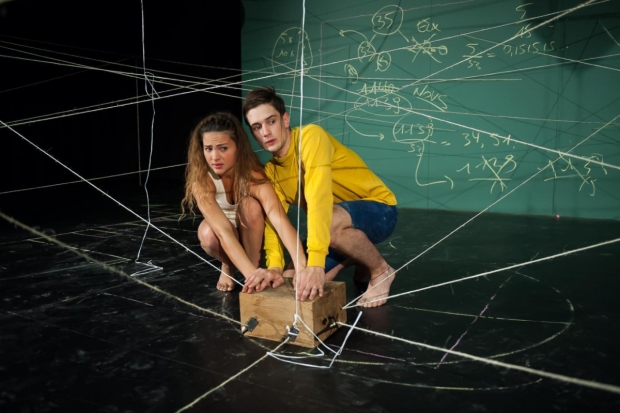Review: Us/Them (Dorfman, National Theatre)
Belgian theatre company Bronks bring their Edinburgh hit to the capital

© Murdo Macleod
I don’t really know what to say about Us/Them, which arrives on the National Theatre’s Dorfman stage emblazoned with plaudits from critics in Edinburgh and across Europe. I know this is not what a critic is meant to say, but I find myself in a dilemma: I can see every single thing that makes the piece good and worthy of praise, and yet it left me absolutely cold.
The work, devised by director Carly Wijs and dramaturg Mieke Versyp for the Belgian Bronks theatre company, takes us back to the day in September 2004 when armed Chechen terrorists stormed School Number One in Beslan, taking hostage more than 1,200 people – the majority of them children. During a two day siege, the captives were kept imprisoned in the school gymnasium, booby-trapped with bombs; they were not allowed to drink, despite the baking heat. When it ended, there were 334 dead, including 186 children.
What distinguishes the production is that it is devised to be seen by older children, so is told from a child’s point of view. With unaffected grace, Gytha Parmentier and Roman Van Houtven impersonate two of the schoolchildren, anxious to communicate the precise facts of the siege from their point of view.
In Stef Stressel’s simple, evocative setting, they draw the shape of the school on the floor with chalk, pointing out where everyone was, and indicating the three tiny exits, easily blocked. They turn the stage into a cat’s cradle of string, to simulate the bomb laden gymnasium; black balloons become the bombs. They show us how a terrorist kept his foot on the detonator, changing shifts every two hours – a strategy that led to the end of the siege and contributed to the carnage. They use a blackboard to calculate the exact proportion of attackers to hostages, faithfully recording the declining figure as people die from dehydration.
But they also tell us things that mattered to them: how long the boy can go without peeing, how many balloons there are in Beslan, how one father will – they are sure – drive his tractor into the building and free them all.
Both performers are dancers as well as actors and their pure agility, leaping wires, racing round the space, falling in a dead faint, commands the space. They are open and engaging. If they were talking to children, then I can imagine the impact they would have. But talking to adults, I started to wonder exactly what they were trying to communicate – why I was watching at all.
True, they create a strong sense of 'otherness' in their description of the Chechens, but their naturally limited viewpoint offers no explanation of a conflict that could lead to this terrible, brutal act. Perhaps there is no explanation possible. But without context of any kind, you are left only with the horror, conveyed as in a child’s fairy tale. I didn’t feel I understood anything any better than at the start.
Only at the very close, when in their description of the way an image of the girl’s dead body is distorted by the media and used, around the world, does the piece aspire to a wider context. And at that point, too, its simplicity is movingly engaging. But for me, it was too little, too late.
Us/Them runs in the Dorfman, National Theatre until 18 February.












